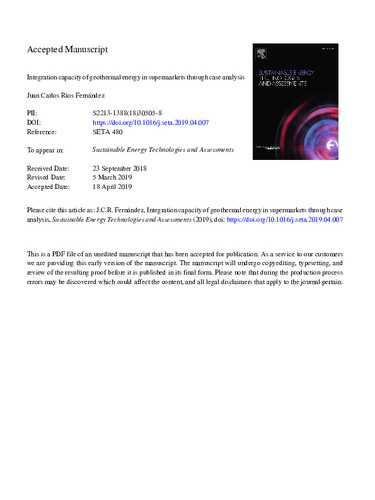Integration capacity of geothermal energy in supermarkets through case analysis
Autor(es) y otros:
Palabra(s) clave:
Geothermal energy
Efficient facilities in supermarkets
Geothermal fluids;
Reduction of greenhouse gas emissions
Fecha de publicación:
Versión del editor:
Citación:
Descripción física:
Resumen:
This article discusses the potential of economic and energy consumption savings in addition to the reduction of greenhouse gases that the use of geothermal energy can have in supermarkets. Three facilities are analysed in Germany, Portugal and Turkey. German installation employed shallow geothermal technology for heating and cooling the supermarket. Portuguese installation consisted of the application of ground source heat pumps to replace traditional air conditioning systems. Turkish installation was the first application in Turkey which took advantage of the storage of thermal energy in an aquifer integrated into a system of air conditioning and ventilation. The use of geothermal energy led to save 45% in energy consumption in the German case, 30% in the Portuguese case and 36% in the Turkish installation. There was a reduction of 28% in CO2 emissions in the German case, 30% in the Portuguese case and 36% in the Turkish installation. The payback period in geothermal energy range from 15 to 16 years and depend on the geological area of implantation and the type of installation. When geothermal energy is used for supermarket air conditioning, the savings in electricity consumption vary between 28–36% and increase to 30–45% when combined with commercial cooling.
This article discusses the potential of economic and energy consumption savings in addition to the reduction of greenhouse gases that the use of geothermal energy can have in supermarkets. Three facilities are analysed in Germany, Portugal and Turkey. German installation employed shallow geothermal technology for heating and cooling the supermarket. Portuguese installation consisted of the application of ground source heat pumps to replace traditional air conditioning systems. Turkish installation was the first application in Turkey which took advantage of the storage of thermal energy in an aquifer integrated into a system of air conditioning and ventilation. The use of geothermal energy led to save 45% in energy consumption in the German case, 30% in the Portuguese case and 36% in the Turkish installation. There was a reduction of 28% in CO2 emissions in the German case, 30% in the Portuguese case and 36% in the Turkish installation. The payback period in geothermal energy range from 15 to 16 years and depend on the geological area of implantation and the type of installation. When geothermal energy is used for supermarket air conditioning, the savings in electricity consumption vary between 28–36% and increase to 30–45% when combined with commercial cooling.
ISSN:
Ficheros en el ítem





